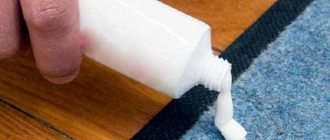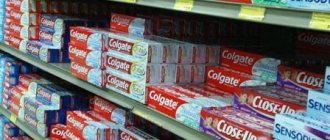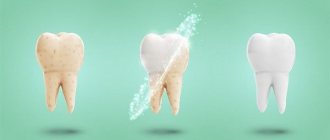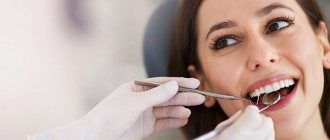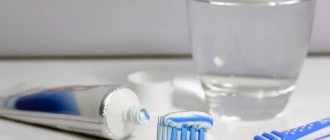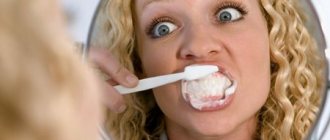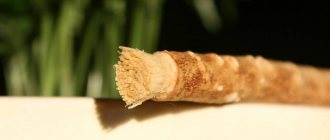No dentist will give a definite answer to the question of which toothpaste you should choose for regular teeth cleaning.
The huge range of toothpastes on the modern market leaves the right of choice to the patient, since the effectiveness of the paste can only be determined after personal experience of using it.
The doctor can only explain which series of products should be used to brush teeth in a particular situation, based on the patient’s oral problems.
Properties of toothpastes
A good toothpaste should have certain properties, namely:
- have a pleasant taste and smell;
- produce a high refreshing effect;
- prevent the formation of plaque on teeth;
- be homogeneous;
- do not dry out or delaminate during storage;
- have an anti-caries effect;
- do not cause allergic reactions, be harmless to the body;
- correspond to the effect stated on the label after use;
- For complete teeth cleaning, a strip of paste 0.5-1 cm long should be enough.
To choose the right toothpaste, you need to carefully study its purpose and composition, since different products are used for different problems of the oral cavity.
Toothpaste “Active calcium” ROCS
Toothpaste is suitable for whitening sensitive teeth. It will help not only whiten them, but also reduce sensitivity. The manufacturer assures that in two weeks of using the toothpaste you can whiten your teeth by 1.5 shades. The abrasiveness of the paste is very low, so you can not be afraid to use the paste on weak gums.
Pros:
- Low abrasiveness of the paste;
- Reliable protection against caries;
- Quickly whitens teeth;
- Normalizes the microflora of the oral cavity;
- Strengthens tooth enamel.
What types of toothpastes are there?
Based on their effect on the oral cavity, pastes are divided into therapeutic, therapeutic and prophylactic and prophylactic. Belonging to one or another group is indicated on the front side of the package, so determining the purpose of the paste at the time of purchase is not difficult.
Depending on the age orientation, pastes are divided into children's and adults. Children's products for small children have a special composition, since there are often cases of them being swallowed by children during cleaning, and the components of adult pastes are prohibited here. Manufacturers add the same substances to toothpastes for older children as to adult products, but in lower concentrations.
The best toothpaste for caries: how to choose
It is worth saying that there is no separate class of “medicinal toothpastes for caries.” Almost 90% of products of this type contain fluoride. It is the main component that helps prevent the development of carious processes. However, the concentration of this substance in a particular toothpaste may vary.
Pastes with a fluorine content of about 1000 ppm have a moderate preventive effect. If this component is contained in a volume of 1450 ppm, the product can be classified as a therapeutic and prophylactic type. To treat teeth for the purpose of remineralization of enamel, pastes with a fluoride concentration of 5000 ppm are used. However, such compositions can only be used for their intended purpose.
The anti-caries effect is achieved if the toothpaste, in addition to fluoride, contains the following components:
- Calcium. If there is not enough of this substance in the enamel, it becomes more vulnerable to caries. Therapeutic paste with calcium helps restore the balance of minerals and prevent the development of the disease or stop it at the initial stage.
- Antiseptics (for example, chlorhexidine). They are not present in every toothpaste. Such compositions are recommended for people with irregular oral hygiene.
- Abrasives and hydrogen peroxide, which have a whitening effect and remove plaque from enamel. Therapeutic toothpastes with similar components can be harmful in case of advanced caries. In general, dentists recommend caution when using products with abrasive components. They are contraindicated for use in cases of increased tooth sensitivity and enamel abrasion.
- Natural components. Such pastes are suitable for sensitive gums and teeth in the cervical area (near the gums). A carious process can develop in this area of the jaw. If you treat your gums, reduce their sensitivity and eliminate bleeding, you can prevent tooth decay.
A good anti-caries paste should have a uniform structure and a pleasant smell. If it contains foreign grains or foreign components, it is better not to use it. It is also important that the paste is easily squeezed out of the tube and distributed evenly over the bristles of the toothbrush. If it is too thick or, on the contrary, liquid, then most likely it does not meet the quality requirements. After twisting the tube, the composition should not harden. If the cap sticks to the threads, the paste may contain some harmful or unknown components.
Now we’ll tell you which specific toothpastes are suitable for caries prevention.
Composition of toothpastes
There are standard components that are included in any paste, regardless of its purpose:
- Abrasives are chalk additives, silicon and calcium compounds. Abrasive components are responsible for the quality of cleansing enamel from plaque.
- Water, glycerin - maintain moisture and consistency of the paste.
- Xanthan gum is a stabilizer and thickener, also responsible for the consistency of the product.
- Foaming substances - depending on their amount, the paste foams more or less while brushing your teeth.
- Sorbitol or xylitol – give the paste a sweet taste. Sorbitol also serves as an emulsifier, and xylitol inhibits the development of cariogenic bacteria.
- Preservatives (sodium benzoate, parabens) – prevent the development of bacteria in an open tube, extend the shelf life of the paste. Should be used in limited quantities in products for children.
- Flavorings – peppermint oil is most often used.
Undesirable components that should be excluded from the composition, or their quantity should be reduced to a minimum, include:
- Polyethylene glycol (PEG) is harmful to the kidneys.
- Sodium lauryl sulfate - in large quantities has a negative effect on the mucous membranes of the mouth and stomach.
- Triclosan, chlorhexidine - have an antibacterial effect and are allowed only for medicinal pastes. With prolonged daily use of products containing these substances, the vital activity of the normal microflora of the oral cavity is disrupted.
Top 8. Biomed White Complex
Rating (2021): 4.55
544 reviews from resources were taken into account: Yandex.Market, Ozon, Wildberries, Otzovik, IRecommend
- Characteristics
Average price: 95 rub. (100 g)
- Active Ingredients: Activated Charcoal, Bamboo Charcoal, Bromelain
- Properties: plaque cleansing, whitening, enamel restoration
Biomed White Complex – dark paste for snow-white teeth. It contains three types of carbon - activated, charcoal and bamboo, which help effectively remove plaque and absorb toxins. The composition also contains calcium and L-arginine to strengthen enamel, zinc citrate, which has antibacterial and anti-inflammatory properties, plantain and birch leaf extracts to protect gums. It is extremely important that the composition does not contain fluoride, parabens, SLS or fragrances. This makes the paste quite safe and approved for use even in children over 6 years of age. The whitening effect is insignificant, but the manufacturer himself says that in 4 weeks you can lighten your teeth by a maximum of 1 tone.
Advantages and disadvantages
- Affordable price
- Natural composition without harmful components
- Three types of charcoal to cleanse and protect against toxins
- Suitable for children from six years old
- Slight brightening effect
Preventative toothpastes
Preventive toothpastes are also called hygienic; their purpose is daily oral care without therapeutic effects. They are used to cleanse and refresh the oral cavity, if there are no complaints about the condition of the teeth and gums.
The main components of these pastes are: chemically precipitated chalk, glycerin, water, flavorings, preservatives and thickeners. Fluoride and calcium are sometimes added to prophylactic products to prevent the development of caries.
Therapeutic and prophylactic agents This is the most extensive group of toothpastes; it is divided into several subgroups.
List of the best hygiene products for cleaning braces
After installing braces, oral hygiene becomes too difficult. Metal elements interfere with high-quality surface treatment. Plaque accumulates in areas directly adjacent to the braces and tartar forms.
For cleaning you have to use special brushes and brushes. At the same time, increased demands are placed on cleaning compositions. They must carefully remove dirt, but not damage the enamel and elements of the bracket system.
- Dentaid Vitis Orthodontic
- Pierrot Natural Freshness
- ROCS Pro Brackets & Ortho
- Professor Persin
- Biorepair Junior
Fluoride-containing pastes
Such pastes are enriched with fluoride in the form of sodium fluoride, aminofluoride or monofluorophosphate in various concentrations. The designation of fluoride concentration on the packaging can be seen as the abbreviation “ppm” (parts per million). For adults, this value should not be higher than 1500 ppm. Fluoride-containing toothpaste should not be swallowed, so it should not be used on children who cannot spit and rinse their mouths.
Fluoride is effective in preventing the development of caries, but it should only be used in areas where low fluoride levels in the water have been confirmed. Residents of areas with sufficient fluoride levels should not use fluoride toothpastes. If you neglect this rule, due to an excess of the element in the body, dental fluorosis will develop - a violation of the pigmentation and structure of tooth enamel.
Main components
Abrasives are responsible for removing plaque, otherwise known as cleaning or polishing agents. These include baking soda, silicon compounds, calcium carbonate or calcium phosphate. More expensive toothpastes contain a substance called hydrating silica, which is a better alternative to baking soda or calcium phosphate.
The abrasiveness of toothpastes is determined using the abrasiveness index. On the packaging it is marked with the abbreviation RDA (Relative Dentin Abrasivity). This indicator was invented by the American Dental Association. RDA determines the ability of a paste to disrupt the structure of tooth enamel and produce mechanical effects (enamel abrasion). It is believed that effective plaque removal is achieved with RDA values just above 100. Regular toothpaste consists of half abrasive components. If it contains more than 50% polishing agents, it can cause tooth sensitivity.
Almost any toothpaste contains foaming agents that save consumption and help fight plaque. However, large amounts of such substances cause irritation and redness in the mouth.
Flavorings and flavoring additives are added to the paste. Also, for normal consistency, toothpastes need binders (also called hydrocalloids) - components that help retain moisture so that bacteria do not grow in the paste, and preservatives.
Without all these components, toothpaste will not work. However, often instead of harmless natural flavors, abrasives and preservatives, chemists use harmful and life-threatening substances.
Remineralizing pastes
The products are designed to strengthen the enamel by saturating it with calcium and phosphorus compounds. Typically, pastes contain calcium citrate and calcium glycerophosphate. To get the proper effect, you need to brush your teeth for at least three minutes.
In addition to toothpastes, remineralizing gels are used at home: they are applied to the teeth and left for the time specified in the instructions for the product.
The use of remineralizing agents is especially indicated for children from 6 years of age, during adolescence, when permanent teeth appear, intensive skeletal growth occurs and the need for calcium increases. Pastes are also recommended for pregnant women, as their tooth enamel often suffers from a lack of calcium.
Just what the doctor ordered
The stereotype “quality is expensive” in many cases reflects reality. But while the average consumer can evaluate the quality of shoes, clothing or food products himself, in the case of toothpaste this is almost impossible. It is clear that high-quality food is tasty, high-quality clothes are well-made and fit well. What should a high-quality pasta be like? Delicious? Interesting looking? With a pleasant smell? This is all important, of course, but the main purpose of the paste is to clean your teeth. How can you evaluate the quality of teeth cleaning without the help of a specialist?
“The dentist should recommend toothpaste,” Eleonora Sakharova is sure. “He can say: you have sensitive enamel, you need a toothpaste with potassium salts. And you go to the pharmacy, and you have a choice: if you like gels, choose gel, if you like mint paste, choose mint, if you like it with stripes, choose with stripes. But you know for sure that not only do you like it, but it also meets the needs of your teeth specifically. And it’s great that we as consumers have the opportunity to choose according to our preferences and financial capabilities.”
In the struggle for consumers, manufacturers of many pastes claim that their paste is the best at preventing caries and dental diseases. And for the most part this is indeed true. “Any paste that contains fluorides, anti-inflammatory and cleansing elements is a powerful tool for the prevention of diseases of the teeth and gums,” says Eleonora Sakharova. “Pastes, of course, cannot cure existing caries, but if a person brushes his teeth regularly and correctly, a healthy lifestyle and undergoes preventive examinations twice a year, he will not have problems with his teeth. And pasta is our main assistant in this.”
However, according to dentists themselves, no more than a quarter of Muscovites regularly visit a doctor for preventive care (in the regions this figure is even lower). This means that the rest are still guided by other considerations. In addition, several years ago, British scientists from the University of Newcastle conducted a study that, although it was widely disseminated, fortunately for toothpaste manufacturers, was perceived by consumers rather as a joke. As a result of experiments on twelve volunteers, scientists concluded that if you do not brush your teeth at all, they will deteriorate, but if you brush too intensely and often, they may fall out.
STANISLAV KRYLOV
Pastes with whitening effect
Many manufacturers of whitening toothpastes are disingenuous when they call them whitening; it would be more correct to call them “brightening” or “with an increased cleansing effect.” Lightening of enamel in pastes occurs by removing plaque and returning the natural color to the teeth. True enamel whitening can only be done in the dentist's office.
Removal of plaque using this group of products occurs due to increased abrasiveness; a tube of paste with a truly cleansing effect should contain information about the abrasiveness index. It is designated by the letters RDA; the higher the digital value of the index, the larger the grinding particles. RDA index values:
- 30-50 – non-abrasive paste, suitable for cleaning sensitive teeth;
- 50-80 – low abrasive, can be used by children over 14 years of age;
- 80-100 – moderately abrasive, used by adults daily;
- 100-200 – high abrasiveness of the paste, teeth are brushed 1-2 times a week, sometimes less often; It is advisable to consult a dentist before use.
The recommended abrasiveness for daily use is RDA 70-80, but you need to focus on the condition of your teeth and gums.
There are pastes in which the enamel is cleansed not through abrasive particles, but through the action of the enzymes papain and bromelain. Enzymes enter into a chemical reaction with plaque, gradually dissolving it.
If the packaging of a whitening toothpaste does not contain information about the RDA index or does not contain enzymes, it is unlikely that this product will be able to lighten tooth enamel.
Why do we brush our teeth?
Our teeth remain in perfectly clean condition only for a short period of time after brushing. Yes, mechanical cleansing with a toothbrush, toothpaste and floss removes all plaque and food particles. But after 20 minutes, a microbial biofilm begins to form in the mouth, and after 2 hours this film already reaches its original level - as before brushing your teeth. Biofilm consists of bacteria, their metabolic products and particles of the gum epithelium. That is, bacteria live in this film, multiply and release acids that destroy enamel. And when the enamel is damaged, caries inevitably occurs.
After a day, the biofilm concentrates, thickens and turns into a microbial plaque; it can no longer be cleaned off on your own. Here you need the help of a dentist - professional teeth cleaning.
Learn more about Air Flow teeth brushing
Why do we brush our teeth?
Products for sensitive teeth
Pastes for sensitive teeth contain strontium chloride, potassium nitrate and sodium citrate - substances that block the sensitivity of nerve endings. A common component is hydroxyapatite; it is capable of creating a protective film on enamel. The pastes also contain extracts and oils of medicinal herbs, which have a beneficial effect on the condition of the gums.
Decreased tooth sensitivity develops a few days after starting to use the medicinal paste. But such products cannot be used for too long due to the fact that they do not have sufficient abrasiveness and do not remove plaque well. In addition, a constant decrease in tooth sensitivity leads to masking the symptoms of other diseases, such as caries.
At first, soft toothbrushes are used with toothpaste for sensitive teeth, but as soon as the painful sensations disappear, you need to return to a regular brush with medium bristles (medium hardness). If this is not done, plaque will begin to accumulate on the enamel.
After a treatment course with toothpaste for sensitive teeth, they switch to using remineralizing pastes.
Toothpaste Estel Professional Alpha Homme Genwood Extra-Mineral Toothpaste
This paste is designed specifically for men, but according to consumer reviews, it can easily be used for women. It contains oak bark extract, zinc and potassium, which strengthen tooth enamel, protect gums, remove plaque, whiten and freshen breath for a long time.
Pros:
- Freshens breath;
- Reliably removes plaque;
- Protects gums;
- Gently whitens teeth;
- Freshens breath for a long time.
Top 6. SPLAT Professional Biocalcium
Rating (2021): 4.59
1646 reviews from resources were taken into account: Yandex.Market, Ozon, Wildberries, Otzovik, IRecommend
The most popular SPLAT Professional Biocalcium is the most popular toothpaste among those presented in the rating, because we were able to find the most positive reviews about it from dentists and ordinary people.
- Characteristics
Average price: 150 rub. (100 g)
- Active ingredients: bioactive calcium, papain
- Properties: comprehensive care, remineralization
SPLAT Professional Biocalcium is an excellent solution for fully strengthening enamel and reducing tooth sensitivity. Bioactive calcium, obtained from eggshells, as well as hydroxyapatite, which are present in the composition, are the most valuable building material for tooth enamel. The presence of papain in the paste guarantees high-quality teeth cleaning, and sodium bicarbonate cares for the gums and normalizes the pH level. The product has proven its effectiveness in combating tooth sensitivity, as well as restoring enamel in the initial stages of caries. It also has a slight whitening effect. We found a lot of reviews about this paste, and it receives only high ratings.
Advantages and disadvantages
- High-quality composition for strengthening enamel
- Helps with the initial stages of caries
- Complete cleansing and care for gums
- Lots of positive reviews
- Weak whitening effect


